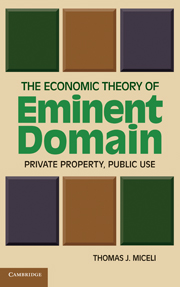1 - Introduction
A Framework for Analysis
Published online by Cambridge University Press: 05 June 2012
Summary
When a social decision to redirect economic resources entails painfully obvious opportunity costs, how shall those costs ultimately be distributed among all members of society?
Frank Michelman (1967, p. 1169)The problem to which the eminent domain clause is directed is that of political obligation and organization. What are the reasons for the formation of the state? What can the state demand of the individual citizens whom it governs and represents?
Richard Epstein (1985, p. 3)Property rights are fundamental to both law and economics. From the perspective of law, property rights define and protect those things that people can and cannot do with the assets under their control, including, but not limited to, land. From the perspective of economics, property rights provide incentives for people to use their assets in an efficient way. Some reflection, however, should reveal that these are two ways of saying the same thing. The incentive function of property rights ultimately resides in the legal protections that they afford to owners, particularly in terms of their right to exclude others (including the government) from infringing on their chosen use. In this way, property rights ensure that their holders will be able to enjoy the fruits of their efforts. Private property rights therefore represent an important pre-requisite for both efficient exchange and development of land, which are the fundamental sources of economic value. As Robert Ellickson (1993, p. 1327) has observed, private property provides incentives for “people to ‘do the right thing’ with the earth's surface.”
- Type
- Chapter
- Information
- The Economic Theory of Eminent DomainPrivate Property, Public Use, pp. 1 - 20Publisher: Cambridge University PressPrint publication year: 2011



